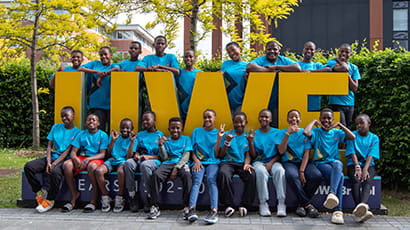Top tips for parents homeschooling their children

With all UK schools closed until further notice, except for the children of key workers and children who have been identified as vulnerable, thousands of parents will have to introduce some form of learning in the home.
To help parents navigate this challenging time, Senior Lecturer in Education at the University of the West of England (UWE Bristol) Ben Wiggins has shared some of his top tips for implementing a successful home-schooling programme and also highlights some potential pitfalls to avoid.
While some parents will find educating their children particularly difficult due to pressures such as caring for relatives or working from home, it is hoped that the advice can still be useful, especially to those with no previous experience of teaching or home-schooling.
Mr Wiggins is self-isolating due to an underlying health condition and is using these techniques himself as he currently home-schools his eight-year-old daughter. He also has nearly 20 years' experience as a Primary School Teacher and is the current leader of the Primary PGCE Teacher Training Programme at UWE Bristol, which was ranked as one of the top five universities for Education in the country by the 2019 Guardian University Guide.
Top tips for home-schooling your primary school aged children:
- Preparation. Even if your school sends you a learning pack try to know what it is you are going to be doing the next day. That way your day will flow better and you won't look like you are just making it up. Share the timetable with your child so they know what they are going to be doing and when
- Structure. Establish a definitive start and end time to the day. Try to get your children to view this as 'school time'. Plan in breaks just like in school and remember, the younger the child the shorter your teaching sessions need to be
- Play. If you have very young children remember to play with them too. You can also incorporate activities such as cooking, DIY projects and gardening into your schooling as they also provide learning
Pitfalls to avoid:
- Don't try to do too much. Remember to get the difficult things out of the way early and leave afternoons for more fun activities
- Try not to get cross if your child doesn't understand. It is difficult to educate your own children because you are so invested in their progress. However, learning takes time and is a messy process so don't worry too much if they don't 'get it' first time
- If your child doesn't understand what you're saying, don't just repeat the same explanation louder and more slowly, try to think of another way of explaining it
- Try not to criticise the way your child does something. Parents can get very defensive about the way they learned to do something but teaching may have changed since then so try to be open minded. Who knows, you might learn something too
''It's important to remember that you're not going to get this right straight away so whatever happens, reflect on it and try something different the next day if things didn't work. If you really don't understand something, email your child's teacher. Things will have changed a lot since you went to school so you shouldn't be embarrassed about asking for help. For example, the teaching of detailed grammar and phonics is fairly new and something most parents will not have been taught themselves,'' says Mr Wiggins.
''Teachers are industrious and creative so I'm sure it won't be long before your child's school shares some interesting and engaging ways for you to educate your child over the coming weeks. In the meantime, try your best, ask for help if you need it and try to enjoy yourself.''
Related news

12 December 2025
UWE Bristol’s environmentally conscious and student-focused accommodation wins three awards
Purdown View, the world's largest certified Passivhaus student accommodation development, has been recognised at Property Week Student Accommodation Awards.

25 November 2025
New community initiative launches to support parents in their child’s education pathway
A new community initiative supporting parents and carers to become champions for their children’s futures launched this month in Bristol.

14 November 2025
Lecturer wins prestigious Times Higher Education award for innovation in teaching
A senior paramedic science lecturer at UWE Bristol has been named the most innovative teacher of the year in the Times Higher Education Awards 2025.

29 September 2025
Smartphone use hitting struggling pupils hardest, major study finds
Young people struggling with their studies at school are much more likely to have negative experiences on their smartphones than their better performing peers, a major new study has found.

24 September 2025
UWE Bristol to help protect threatened forest in Madagascar in £800k project
UWE Bristol is a partner in a groundbreaking project awarded almost £800,000 in funding to protect one of Madagascar’s most precious and threatened forests.

11 September 2025
New study to investigate augmented reality as an intervention for emotionally based school avoidance
A UWE Bristol researcher will support a new study exploring whether an augmented reality board game can help young people with emotionally based school avoidance (EBSA).

09 September 2025
Project Zulu choir celebrates another record-breaking tour
Nearly £37,000 was raised during three unforgettable weeks of the 2025 Project Zulu choir tour – setting a new fundraising record since the tour began.

29 July 2025
Graduation for ‘tireless’ student committed to improving healthcare for deaf people
A paramedic science student who single handedly brought British Sign Language and deaf awareness training to hundreds of his fellow students has graduated.

16 July 2025
Vast majority of rural councils have no targets for social housing, study finds
New research reveals a serious shortfall in rural social housing, with only 20 per cent of local authorities setting targets to deliver it.

27 June 2025
UWE Bristol and Avon and Somerset Police renew partnership to advance police education
UWE Bristol and Avon and Somerset Police have signed a new 10-year agreement, extending their successful partnership to deliver high-quality, forward-thinking police education and training.

16 June 2025
Citizens take centre stage in groundbreaking cultural plan for the West of England
UWE Bristol is supporting Citizens for Culture – a new scheme which will empower people across the West of England to shape the region’s cultural future.

13 June 2025
Schools Outreach Manager receives MBE for trailblazing cyber security initiative for young people
A UWE Bristol manager who founded a pioneering cyber security initiative for young people has been recognised in the King’s Birthday Honours list.






